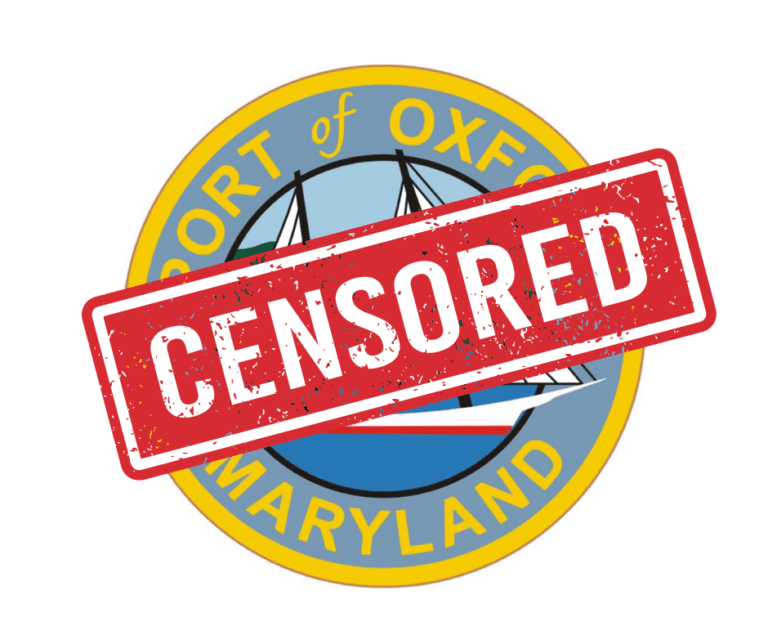Please Follow us on Gab, Minds, Telegram, Rumble, GETTR, Truth Social, Twitter
President of the Oxford Commissioners Norman Bell ran on a platform of “openness” during his campaign. Since taking office, he seems to have changed his mind.
Before a packed meeting room of town citizens, Bell and fellow Commissioner Tom Costigan went against the wishes of those attending and many others who wrote letters. They voted to implement a Resolution to amend the rules for conduct at Commission meetings.
It was initially pointed out by Commissioner Greer that the proposals for the resolution posted on the town’s website were not the same as the ones being discussed. This is a violation of town policy which requires that all resolutions and/or ordnances being voted on by Commissioners are posted prior to meetings so that citizens may view the exact resolutions/ordnances and comment on them.
As of the writing of this article, we could not find any copies of either resolution on the Oxford Town Website.
That didn’t seem to matter to Bell. During the Commissioners discussion about the proposal, members of the audience called out that the versions being considered were different to those posted, to which Bell yelled sternly, “There’ll be no back talk.” One member of the audience reminded Commission President Bell, “We are not your children.”
“You’re not my children but this is a Commissioner’s meeting,” Bell answered brusquely.
“This is a TOWN meeting,” the citizen said.
After some back and forth between the Commissioners regarding the confusion, Greer suggested that they forgo a vote on the proposals that night, have a work session to craft a proposal together, and then vote on it at a later meeting. Bell, obviously irritated at the thought of postponing what is a procedural matter, dug his heels in and said he wanted to vote on the proposals, then have a work session later this month to review them, and then possibly amend the Resolution later.
This seemed odd to many in the audience that Commissioner Bell was in such a hurry to adopt this proposal over the objections of so many when the vote could be postponed, and time could be spent creating a proposal that would be better for all involved.
This vote also seemed contradictory and backward to many in the audience who questioned why Commissioners would vote on a flawed proposal only to amend it in a meeting weeks later. As usual, Costigan and Bell voted together to pass the proposal with Greer voting “no.”
During public comment, it seemed that consensus was on Greer’s side.
Resident Debbie Krolicki said she attended Constitution Week last week with the Daughters of the American Revolution which fell on the same day as Constitution Day. She then handed out copies of the Constitution to the Commissioners.
“Please check out Amendment number 1. And, just remember when you, all three of you, became Commissioners, you put your hand up and made an oath that you would uphold the Constitution.” Krolicki stated.
“By the way,” she pointed at Bell, “At the last meeting you introduced your policy. No one had ever heard it or seen it. I think you said everyone had gotten it and seen it, but we only got it that day.”
Dave Donovan then spoke and reminded the Commissioners of the Town Charter statement regarding the right of citizens to speak at any town meeting regarding town business.
” I don’t think that means everything that is brought before the Commission, but it certainly does mean everything that is brought before the Commission for a vote. The opportunity to speak at the end of the meeting after it’s been voted on is not a reasonable opportunity to be heard. ” Donovan said, He then added that he was glad that some more restrictive measures had been from the original proposal Bell wrote.
Regarding providing written answers to publicly posed questions after meetings, Donovan also pointed out that “more times than not, it may be helpful to say yes, no, or here’s the information, or we’ll get back to you later.” He also pointed out that when he had written letters to the Commissioners to be included in the minutes and asked if he was following the correct procedures, he got no answers. Donovan said that residents need to know “what the magic words are” to get letters submitted to the minutes.
Debra Lavoie, who mentioned she had only lived in town for less than two years, congratulated the crowd in attendance for filling what used to be an empty room for meetings. ” It’s wonderful how engaged everyone is.” She then asked if residents attending the workshop on the proposal would be able to ask questions at that workshop.
Bell said that depends on the purpose of the workshop, to which Lavoie answered, “Everyone wants transparency, and everyone wants to know what’s going on. ” Again, it’s something Bell campaigned on.
Long time town resident Emily Knud Hanson then spoke and said, ” I thought the procedure tonight was really unfair about the resolution about accepting your proposal, sir, and not considering Katrina’s and then saying we’re going to pass our resolution and then we’ll find out what’s in it, which reminds me of someone else that was in politics at one point. We deserve to find out what you’re voting on before you say we’ll vote on this resolution and then we’ll deal with amendments. I think that’s really backwards. I think you try to put a resolution together, consider all the comments, and make a nice cohesive document that makes sense to everybody including the three of you but to put a resolution in front of you that was singularly written, it’s obvious that there’s confusion about whether it was posted, what version was posted, and I think that’s extremely unfair to the voters to not give them a concise document that they can respond to before you vote on it.
Many in the crowd applauded Knud-Hanson.
The pleas fell on deaf ears.
The question is why Commissioners Bell and Costigan seem almost frantic in getting this Resolution passed. Why is Bell being rude, disrespectful, and impatient with constituents regarding this issue? It has to be more than just the egotistical desire for total control.
One reason given by Bell is that town meetings are the only times, due to the Open Meetings Act, that Commissioners can talk to each other regarding town business. If one examines past town minutes from 2010-2012, this type of discussion occurred at town meetings all the time. It was raucous at times, but at least the residents of Oxford knew that issues were being worked on by the people they elected in public view with total transparency. There is nothing wrong with that happening now.
Past meetings, save one, have been fairly orderly with public comments on very important issues such as tree cutting, the plastic bag ban, and the flood mitigation plan. Prior to Bell’s election, the Commissioners tolerated and encouraged much more spirited exchanges with the public in meetings.
This frantic push is reminiscent of when the Commissioners slow walked the election referendum in 2023 in order to hurriedly appoint Susan Delean Botkin, the overwhelming loser of an election against Katrina Greer, to the Commission to replace departing Commissioner Brian Wells. There was something they needed to get passed before Greer was sworn on to the Commission and Wells left. Greer was a person they could not control.
Many think that Commissioners Bell and Costigan know that information is being uncovered in Oxford that could create ethical and legal issues for the town. They probably know that with the discovery of $212,000 unaccounted for in town spending on grants the demand for a forensic audit will become louder and more insistent. Neither of the above Commissioners, for some reason, want a forensic audit, even though neither would be implicated in any wrongdoing since the grants were conducted well before any of them were in office.
But there could be other issues, and it is difficult to control public comment and prevent it from revealing truths the Commissioners don’t want revealed regarding town business.
There is also a theory that Bell and Costigan wish to squelch public comment in the future if there is a drive for Oxford to annex the Spring and Bradley properties directly outside town. If citizens are not allowed to ask questions about issues prior to votes, annexation could have clear sailing.
Another question is who is being protected here? There are many theories about a “shadow” government in the town, a small group of people who have controlled the actions of the Commissioners and Town Office since 2012. Many in this small group of people supported Norm Bell in his 12-vote victory in June. The names of this group of people pepper the minutes of past meetings constantly and they are consistently given town committee and board assignments. Several of them played prominent roles in Oxford politics.
Prior to the last four or five years, Oxford has been a place where citizens had a voice in what happened in their hometown. It seems that a candidate who promoted “openness” would want to maintain that practice.
What’s the answer? It’s certainly not repressing the free speech of citizens. This excerpt from a paragraph from the FIRE (Foundation for Individual Rights and Expression) website describes what happens when free speech is stifled:
Justice Brandeis advanced the safety valve theory of free speech in his concurring opinion in Whitney v. California (1927) when he wrote:
Those who won our independence believed . . . that it is hazardous to discourage thought, hope and imagination; that fear breeds repression; that repression breeds hate; that hate menaces stable government; that the path of safety lies in the opportunity to discuss freely supposed grievances and proposed remedies.
According to Brandeis, free speech is the safety valve that keeps tension from mounting. People who have free speech are less likely to lash out.
If the Oxford Commissioners truly want meetings that are productive and civil, if they truly want the respect and valued input of the citizenry, if they truly want to make our town better for everyone, they need to promote the citizen’s right to speak at town meetings regarding issues that affect their lives in the town.
They also need to remember their role as elected SERVANTS of the people and have respect for the people they serve and their rights.
This proposal and the way it was passed is exactly the wrong thing to do. It didn’t serve anyone well.
And, people are paying attention.
We recently wrote about Oxford and Ridgely stifling free speech:
Are Free Speech And Citizens’ Rights Dying In American Small Towns? – Easton Gazette
More information:
The livestream of the meeting can be found here:
This article was originally featured on the Easton Gazette.

